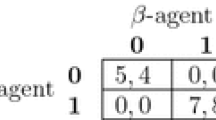Abstract
We consider two players each of whom attempts to predict the behavior of the other, using no more than the history of earlier predictions. Behaviors are limited to a pair of options, conventionally denoted by 0, 1. Such players face the problem of learning to coordinate choices. The present paper formulates their situation recursion theoretically, and investigates the prospects for success. A pair of players build up a matrix with two rows and infinitely many columns, and are said to “learn” each other if cofinitely many of the columns show the same number in both rows (either 0 or 1). Among other results we prove that there are two collections of players that force all other players to choose their camp. Each collection is composed of players that learn everyone else in the same collection, but no player that learns all members of one collection learns any member of the other.
Similar content being viewed by others
REFERENCES
Bārzdiņš, J. and R. Freivalds: 1972, 'On the Prediction of General Recursive Functions', Soviet Mathematics Doklady 13, 1224-1228.
Blum, Lenore and Manuel Blum: 1975, 'Toward a Mathematical Theory of Inductive Inference', Information and Control 28, 125-155.
Earman, J.: 1992, Bayes or Bust? MIT Press.
Gold, E.M.: 'Language Identification in the Limit' Information and Control 10, 447-474.
Jain, S., Osherson, D., Royer, J., and Sharma, A.: 1999, Systems that Learn, Second Edition, M.I.T. Press, Cambridge MA.
Kelly, Kevin T.: The Logic of Reliable Inquiry, Oxford.
Machtey, M. and P. Young: 1978, An Introduction to the General Theory of Algorithms, North Holland, New York City.
Martin, E. and D. Osherson: 1998, Elements of Scientific Inquiry, M.I.T. Press.
Rogers., H.: 1987, Theory of Recursive Function and Effective Computability, MIT Press, New York.
Author information
Authors and Affiliations
Rights and permissions
About this article
Cite this article
Montagna, F., Osherson, D. Learning to Coordinate; a Recursion Theoretic Perspective. Synthese 118, 363–382 (1999). https://doi.org/10.1023/A:1005182121401
Issue Date:
DOI: https://doi.org/10.1023/A:1005182121401




